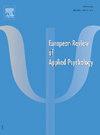Mesurer l’habitude de la voiture et tester empiriquement des facteurs explicatifs de sa variabilité
IF 1.4
4区 心理学
Q3 PSYCHOLOGY, APPLIED
European Review of Applied Psychology-Revue Europeenne De Psychologie Appliquee
Pub Date : 2025-06-01
DOI:10.1016/j.erap.2023.100906
引用次数: 0
Abstract
Introduction
Understanding factors that influence car habit formation and variability would likely improve the effectiveness of measures aimed to change mobility behavior.
Objectives
The two objectives of this paper are to validate a French version of a synthetic scale for habit assessment and to test factors that influence car habit.
Method
A validation procedure was implemented on data collected from two samples (n = 721 and 241). Multiple regression analyses were then conducted to test the relative influence of situational (area of residence, alternative model pass, car availability) and psychological (environmental values, environmental identity, car pollution awareness, and attitude towards car use) variables on the variability of car habit measurement.
Results
The one-dimensional structure of the French version of the synthetic scale for habit assessment, its internal consistency and temporal reliability were verified. Analyses also establish a link between car habit and its declared use. The situational context plays an important role in habit formation. Car attitude is the variable that most strongly and positively influences the variability of car habit, whereas psychological variables relating to environmental issue have a weaker and negative influence.
Conclusion
The psychometric data reported in this article allow us to conclude that the French version of the synthetic scale for habit assessment that we propose is valid for measuring car habit. It is relevant both for the evaluation of interventions aimed at reducing car use and for their development according to the stage of change.
衡量汽车的习惯,实证测试解释其可变性的因素
了解影响汽车习惯形成和可变性的因素可能会提高旨在改变出行行为的措施的有效性。本文的两个目的是验证法国版的习惯评估综合量表,并测试影响汽车习惯的因素。方法对2个样本(n = 721和241)的数据进行验证。通过多元回归分析,检验情境变量(居住区域、备选车型通行证、汽车可得性)和心理变量(环境价值观、环境认同、汽车污染意识和汽车使用态度)对汽车习惯测量变异性的相对影响。结果验证了法语版习惯综合量表的一维结构、内在一致性和时间信度。分析还建立了汽车习惯和其公开用途之间的联系。情景语境在习惯形成中起着重要作用。汽车态度是影响汽车习惯可变性最强烈和最积极的变量,而与环境问题相关的心理变量的影响较弱和消极。结论本文所报告的心理测量数据使我们得出结论,我们提出的法语版习惯评估综合量表对测量汽车习惯是有效的。它既适用于评估旨在减少汽车使用的干预措施,也适用于根据变化阶段发展干预措施。
本文章由计算机程序翻译,如有差异,请以英文原文为准。
求助全文
约1分钟内获得全文
求助全文
来源期刊

European Review of Applied Psychology-Revue Europeenne De Psychologie Appliquee
PSYCHOLOGY, APPLIED-
CiteScore
2.20
自引率
20.00%
发文量
38
期刊介绍:
The aim of the Revue européenne de Psychologie appliquée / European Review of Applied Psychology is to promote high-quality applications of psychology to all areas of specialization, and to foster exchange among researchers and professionals. Its policy is to attract a wide range of contributions, including empirical research, overviews of target issues, case studies, descriptions of instruments for research and diagnosis, and theoretical work related to applied psychology. In all cases, authors will refer to published and verificable facts, whether established in the study being reported or in earlier publications.
 求助内容:
求助内容: 应助结果提醒方式:
应助结果提醒方式:


